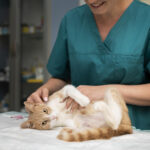Just like humans and dogs, cats can experience a range of bodily functions. You might be accustomed to hearing your dog burp after gulping down water or finishing a meal, but what about your feline companion? Have you ever wondered, “Can Cats Burp?” It’s a question many cat owners ponder, and the answer might surprise you.
While it’s not as common or noticeable as in dogs or humans, cats can burp. However, feline burping is generally infrequent and can sometimes indicate an underlying issue. This article delves into the world of cat burps to help you understand when a little belch is normal and when it might signal a need for veterinary attention.
Is Burping Normal for Cats?
In most cases, the answer is no, burping is not considered a normal daily occurrence for cats. Unlike dogs who might burp after eating or drinking quickly, or humans who burp as part of digestion, cats are built differently. Their respiratory system primarily relies on nasal breathing, which minimizes the amount of excess air entering their digestive system. Therefore, a regular, loud belch from your cat after their meal is not typical behavior.
Alt text: A relaxed ginger cat lounges on a grey couch, seemingly content, illustrating that burping is not a typical behavior for healthy, comfortable cats.
Why Do Cats Burp? Unpacking the Potential Causes
Although not a routine behavior, cats do burp on occasion. Usually, a cat burping is linked to some form of gastrointestinal (GI) upset. Cats are known for their sensitive stomachs, and various factors can disrupt their digestive balance, potentially leading to a burp. Here are some of the common reasons why your cat might burp:
Common Causes of Burping in Cats
- Gastrointestinal Issues: Conditions like sensitive stomach, indigestion, and acid reflux can all increase the likelihood of your cat burping. When their digestive system is irritated or imbalanced, it can lead to gas build-up, which might be released as a burp.
- Hairballs: Those pesky clumps of fur! Hairballs are a frequent issue for cats, especially long-haired breeds. As cats groom themselves, they ingest hair, which can accumulate in the stomach. Attempting to expel hairballs can sometimes trigger burping or gagging sounds.
- Esophagitis: Inflammation of the esophagus, known as esophagitis, can also be a cause of burping. This inflammation can be triggered by various factors, including acid reflux or even the administration of pills. Some oral medications, if not followed by water, can irritate or even scratch the esophageal lining as they go down.
- Swallowing Excess Air: While cats are nasal breathers, they can still swallow excess air, particularly when eating or drinking too quickly, or when given treats or medication. This swallowed air can lead to burping as the body tries to expel it.
Less Common Causes of Burping in Cats
- Inflammatory Bowel Disease (IBD): Feline IBD is a group of chronic inflammatory conditions affecting the digestive tract. Inflammation throughout the GI tract can cause a range of symptoms, including burping, alongside more prominent signs like vomiting, diarrhea, weight loss, lethargy, bloody stool, and decreased appetite.
- Anesthesia: In rare instances, burping can occur after a cat has undergone anesthesia for a surgical procedure. Anesthetic agents can temporarily affect the muscles involved in digestion, potentially leading to burping as the body recovers. This type of burping should be short-lived as the anesthesia wears off.
Alt text: A veterinarian gently examines a cat on an examination table, emphasizing the importance of professional veterinary care when a cat exhibits unusual symptoms like frequent burping.
When Should You Be Concerned About Cat Burping? Recognizing Warning Signs
Occasional, infrequent burping might not be a cause for immediate alarm. Just like humans, cats can have a random burp now and then without it indicating a serious problem. If your cat lets out a single burp sporadically, and otherwise seems healthy and displays normal behavior, it’s likely nothing to worry about.
However, it’s crucial to pay attention to the frequency and context of your cat’s burping. Frequent or excessive burping is not normal and warrants a closer look. If your cat seems to be burping more than just occasionally, or if the burping sounds excessive or strained, it’s time to consider potential underlying issues.
Seek veterinary attention promptly if you observe any of the following in conjunction with burping:
- Frequent Burping: Burping that occurs multiple times a day or becomes a regular occurrence.
- Difficulty Breathing: Any signs of labored breathing, wheezing, or coughing alongside burping.
- Gastrointestinal Distress: Symptoms like vomiting, diarrhea, loss of appetite, or changes in stool consistency.
- Lethargy: Unusual tiredness or lack of energy.
- Nasal Congestion, Hacking, or Excessive Gagging: These symptoms, combined with burping, can indicate respiratory or digestive issues requiring veterinary evaluation.
What Should You Do If Your Cat Is Burping? Taking Action for Your Cat’s Health
If you are concerned about your cat’s burping, the best course of action is to consult with your veterinarian. A vet visit is essential to rule out any underlying medical conditions and get to the root of the issue.
Here are steps to take if your cat is burping:
- Schedule a Vet Appointment: Don’t delay in contacting your veterinarian if you are worried about the frequency or associated symptoms of your cat’s burping.
- Record a Video: Cats are masters at hiding symptoms at the vet’s office! Try to capture a video of your cat burping or making any unusual sounds. This video can be invaluable for your veterinarian to understand what’s happening.
- Provide Medical History: Be prepared to inform your vet about your cat’s recent medical history, including any procedures, medications, or diagnosed conditions. Note if the burping started or changed around the time of a new medication or treatment.
- Diet and Feeding Habits: Discuss your cat’s diet and feeding habits with your veterinarian. Rapid eating can contribute to swallowing air.
Depending on the diagnosis, your veterinarian might recommend:
- Medication: If esophagitis is diagnosed, medication to soothe and heal the esophageal lining might be prescribed.
- Dietary Changes: For cats with IBD or sensitive stomachs, a high-quality, easily digestible diet can be beneficial. Your vet can recommend a diet tailored to your cat’s specific needs to minimize gastric irritation and support healthy digestion. Smaller, more frequent meals and puzzle feeders can also help slow down eating and reduce air intake.
- Hairball Management: If hairballs are a contributing factor, your vet can suggest hairball remedies or dietary changes to minimize hairball formation.
- Further Diagnostic Tests: In some cases, further tests like blood work, fecal exams, or imaging may be needed to pinpoint the cause of the burping.
In conclusion, while cats can burp, it’s not a normal or frequent occurrence. Occasional burps might be benign, but frequent burping or burping accompanied by other symptoms should always be investigated by a veterinarian. By being attentive to your cat’s behavior and seeking timely veterinary care when needed, you can ensure your feline friend stays healthy and happy.
WRITTEN BY:
Veterinarian
Dr. Stephanie Betbeze graduated from the Lincoln Memorial University-College of Veterinary Medicine in 2019, after receiving a Bachelor’s…


